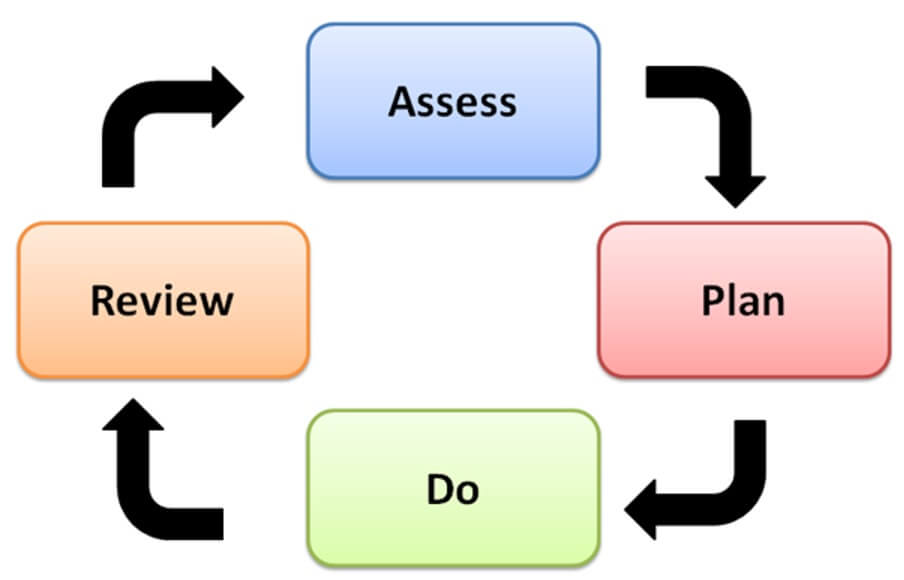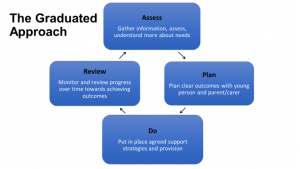SEN Support

SEN Support is the system by which schools should assess the needs of children, and then provide appropriate support. The system should follow four stages, often referred to as a ‘cycle’: Assess, Plan, Do, Review.
A pupil has SEN where their learning difficulty or disability calls for special educational provision, namely provision different from or additional to that normally available to pupils of the same age.
What does SEN Support mean?
Chapter six of the SEND Code of Practice (the “Code”) deals with the actions that mainstream schools (including mainstream academies) should take to meet their duties to identify and support children with SEN. (This chapter does not apply to children in special schools, because special schools are specifically organised to provide for children with SEN, and all children in special schools should have an EHC plan setting out the provision required to meet their needs.)
Where a pupil is identified as having SEN, schools should take action to remove barriers to learning and put effective special educational provision in place.
Schools should assess each pupil’s current skills and levels of attainment on entry and regular further assessments should take place. These should seek to identify pupils making less than expected progress building on information from previous settings and key stages where appropriate. At the same time, schools should consider evidence that a pupil may have a disability under the Equality Act 2010 and, if so, what reasonable adjustments may need to be made for them.
The SEND Code of Practice refers to four broad areas of need:
- Communication and interaction;
- Cognition and learning;
- Social, emotional and mental health;
- Sensory and/or physical needs.
A child could, of course, have needs falling in more than one area. The expectation is that schools will plan how to deal with each of these areas of need and ensure that their staff have relevant training and are equipped to respond. Special educational provision in schools is called SEN Support.
High quality teaching, differentiated for individual pupils, is the first step in responding to pupils who have or may have SEN. (Also known as Quality First Teaching).
Please click here to view video on ‘No Excuses Camden Local Offer Quality teaching and learning for ALL learners’.
Where progress continues to be less than expected the class or subject teacher, working with the SENDCO, should assess whether the child has SEN.
While informally gathering evidence (including the views of the pupil and their parents) schools should not delay in putting in place extra teaching or other rigorous interventions designed to secure better progress, where required.
Parent/carers know their children best and it is important that all professionals listen and understand when parents express concerns about their child’s development. They should also listen to and address any concerns raised by children and young people themselves.
SEN support should take the form of a four-part cycle through which earlier decisions and actions are revisited, refined and revised with a growing understanding of the pupil’s needs and of what supports the pupil in making good progress and securing good outcomes. This is known as the graduated approach.

Assess
This information gathering process should include an early discussion with the pupil and their parents. These early discussions with parents should be structured in such a way that they develop a good understanding of the pupil’s areas of strength and difficulty, the parents’ concerns, the agreed outcomes sought for the child and the next steps.
A short note of these early discussions should be added to the pupil’s record on the school information system and given to the parents. Schools should also tell children, parents and young people about the local authority’s Information, Advice and Support Service.
In identifying a child as needing SEN support the class or subject teacher, working with the SENDCO, should carry out a clear analysis of the pupil’s needs. This should draw on the teacher’s assessment and experience of the pupil, their previous progress and attainment, as well as information from the school’s approach to pupil progress, attainment, and behaviour. It should also draw on subject teachers’ assessments where relevant, the individual’s development in comparison to their peers and national data, the views and experience of parents, the pupil’s own views and, if relevant, advice from external support services. Schools should take seriously any concerns raised by a parent. These should be recorded and compared to the setting’s own assessment and information on how the pupil is developing. This assessment should be reviewed regularly.
In some cases, outside professionals from health or social services may already be involved with the child. These professionals should liaise with the school to help inform the assessments. Where professionals are not already working with school staff the SENDCO should contact them if the parents agree.
Plan
Where it is decided to provide a pupil with SEN support, the parents must be formally notified, although parents should have already been involved in forming the assessment of needs as outlined above. The teacher and the SENDCO should agree in consultation with the parent and the pupil the adjustments, interventions and support to be put in place, as well as the expected impact on progress, development
or behaviour, along with a clear date for review.
All teachers and support staff who work with the pupil should be made aware of their needs, the outcomes sought, the support provided and any teaching strategies or approaches that are required. This should also be recorded on the school’s information system.
Parents should be fully aware of the planned support and interventions and, where appropriate, plans should seek parental involvement to reinforce or contribute to progress at home. The recorded information should be readily available to and discussed with the pupil’s parents.
Do
The class or subject teacher should remain responsible for working with the child on a daily basis. Where the interventions involve group or one-to-one teaching away from the main class or subject teacher, they should still retain responsibility for the pupil. They should work closely with any teaching assistants or specialist staff involved, to plan and assess the impact of support and interventions and how they
can be linked to classroom teaching.
Review
The effectiveness of the support and interventions and their impact on the pupil’s progress should be reviewed in line with the agreed date.
The impact and quality of the support and interventions should be evaluated, along with the views of the pupil and their parents. This should feed back into the analysis of the pupil’s needs. The class or subject teacher, working with the SENDCO, should revise the support in light of the pupil’s progress and development, deciding on any changes to the support and outcomes in consultation with the parent and pupil.
Transition
SEN support should include planning and preparation for the transitions between phases of education and preparation for adult life. To support transition, the school should share information with the school, college, or other setting the child or young person is moving to. Schools should agree with parents and pupils the information to be shared as part of this planning process.
Involving specialists
Where a pupil continues to make less than expected progress, despite evidence-based support and interventions that are matched to the pupil’s area of need, the school should consider involving specialists, including those secured by the school itself or, from outside agencies. Schools may involve specialists at any point to advise them on early identification of SEN and effective support and interventions. A school should always involve a specialist where a pupil continues to make little or no progress or where they continue to work at levels substantially below those expected of pupils of a similar age despite evidence-based SEN support delivered by appropriately trained staff.
Please click here for Camden Local Offer SEN Support Information.
Click here to view/download the SENDIASS Parent Training PowerPoint.





